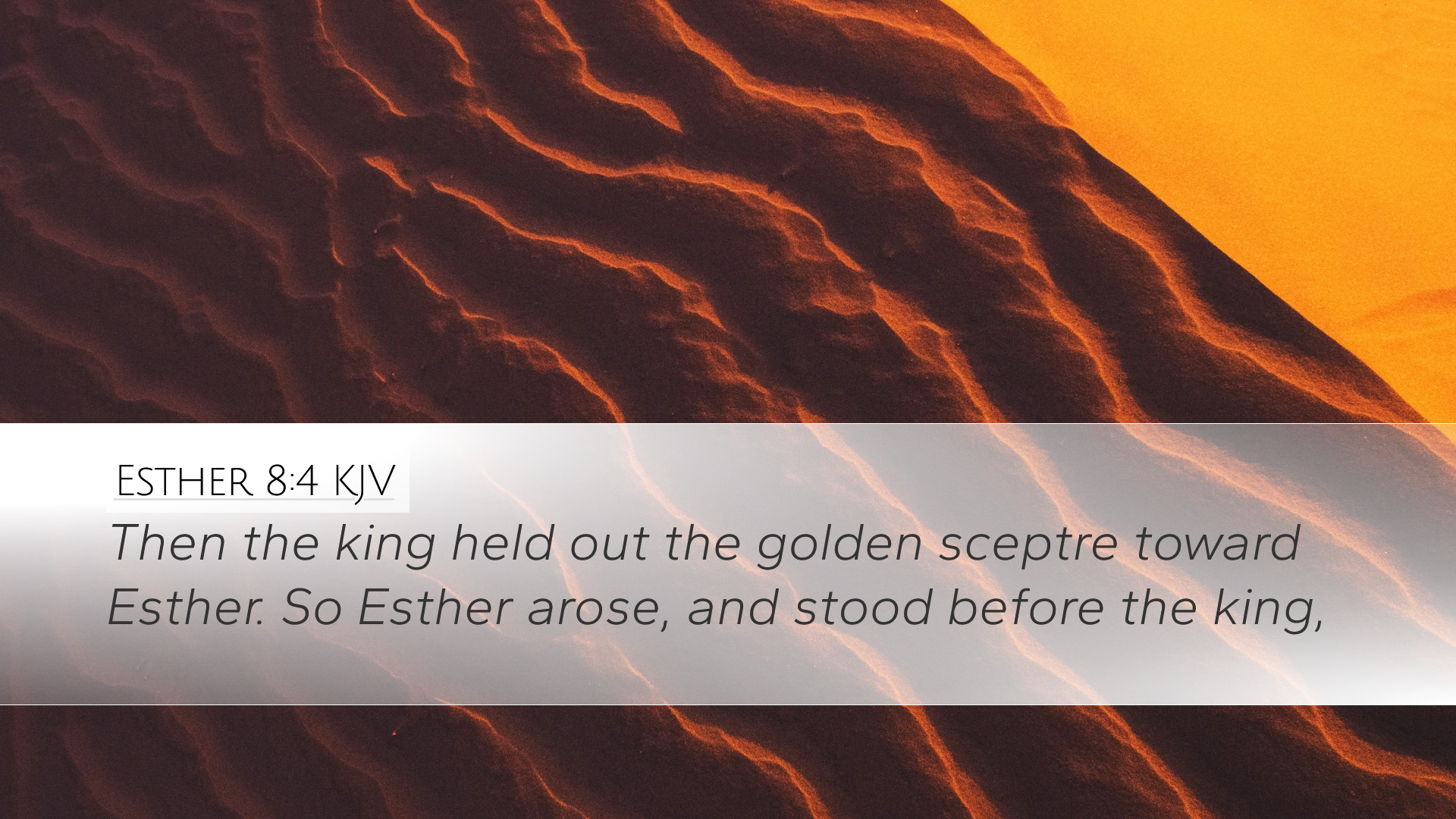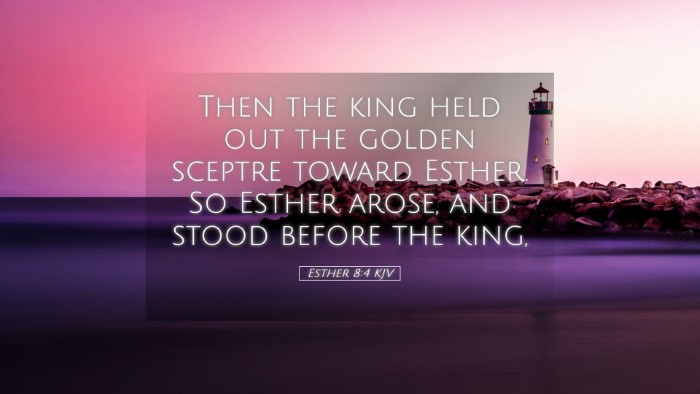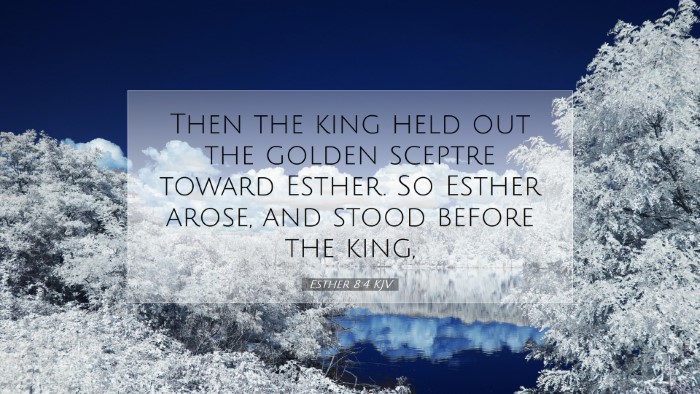Old Testament
Genesis Exodus Leviticus Numbers Deuteronomy Joshua Judges Ruth 1 Samuel 2 Samuel 1 Kings 2 Kings 1 Chronicles 2 Chronicles Ezra Nehemiah Esther Job Psalms Proverbs Ecclesiastes Song of Solomon Isaiah Jeremiah Lamentations Ezekiel Daniel Hosea Joel Amos Obadiah Jonah Micah Nahum Habakkuk Zephaniah Haggai Zechariah MalachiEsther 8:4
Esther 8:4 KJV
Then the king held out the golden sceptre toward Esther. So Esther arose, and stood before the king,
Esther 8:4 Bible Commentary
Commentary on Esther 8:4
Esther 8:4 (ESV): "Then the king held out the golden scepter toward Esther. And Esther rose and stood before the king."
Introduction
The Book of Esther intricately weaves themes of providence, courage, and divine deliverance. Esther 8:4 marks a critical juncture in the narrative, encapsulating both Esther’s courage and the king’s favor. This commentary synthesizes insights from public domain commentaries, including those of Matthew Henry, Albert Barnes, and Adam Clarke, presenting a meaningful exploration for pastors, students, theologians, and Bible scholars.
Contextual Background
The events leading up to Esther 8:4 are pivotal in understanding its significance. Queen Esther, a Jewish woman, has risked her life approaching King Ahasuerus to intercede for her people, who faced annihilation under Haman’s decree. The king's response to Esther is not merely a mundane royal gesture; it symbolizes divine providence and approval.
Analysis of Key Themes
-
Courage in Advocacy
Esther’s act of approaching the king reflects immense bravery. Matthew Henry emphasizes the gravity of Esther’s situation: she enters the royal court uninvited, which could lead to her death (Esther 4:11). Her willingness to risk everything for her people portrays a deep commitment to justice and protection.
-
Royal Favor and Divine Intervention
Albert Barnes notes that the king holding out the golden scepter signifies acceptance and grace. This moment illustrates how God orchestrates events, leading to Esther’s favor in the eyes of the king. The scepter represents authority and power, and its extension symbolizes the king's heart being directed by God, as seen earlier in Proverbs 21:1.
-
The Role of Intercession
Esther stands before the king, embodying the role of an intercessor. Adam Clarke highlights how this moment is emblematic not only of Esther’s intercession for her people but also serves as a type of Christ, the ultimate intercessor. This parallel encourages believers to approach God boldly, knowing they have a mediator who advocates for them.
Theological Implications
This verse invites readers to reflect on key theological themes:
-
Providence:
The unfolding of events leading to Esther’s audience with the king exemplifies God’s providence. His unseen hand shapes circumstances to achieve His redemptive plans, a truth echoed throughout scripture (Romans 8:28).
-
Courage and Faith:
Esther’s bravery in facing potential death underlines the call to faith in challenging circumstances. Believers are often called to stand firm in difficult situations, reminding them of the biblical assurance of God’s presence (Isaiah 41:10).
-
Intercession:
The significance of intercession is central to the Christian faith. Just as Esther risked her life for her people, believers are called to stand in the gap for others. The importance of prayer and advocacy, whether for individuals or broader societal issues, is a stewardship entrusted to all Christians.
Practical Applications
Esther 8:4 encourages meaningful applications for today’s readers:
-
Stepping into Difficult Situations:
Pastors and Christians are called to engage in difficult dialogues and situations, advocating for those who cannot advocate for themselves, much like Esther.
-
Courageous Living:
This passage calls for a life of bravery rooted in faith. Thus, believers are encouraged to take bold steps in faith, trusting in God's protection and guidance.
-
Embracing Intercessory Roles:
Believers should embrace their roles as intercessors, praying for others and seeking justice in their communities, reflecting Christ’s love and grace.
Conclusion
Esther 8:4 is rich with implications that resonate across generations. The courage of Esther, the divine favor illustrated by the king's scepter, and the theme of intercession provide timeless lessons for believers today. As the narrative unfolds beyond this verse, readers are encouraged to witness God’s ultimate deliverance through Esther’s brave actions. May this exploration inspire faith-filled courage and a commitment to advocacy within the hearts of all who study these sacred scriptures.


